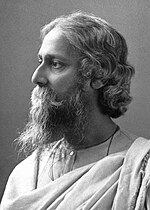ਜਨ ਗਣ ਮਨ
| ਅੰਗਰੇਜ਼ੀ: "Thou Art the Ruler of the Minds of All People" | |
|---|---|
 "ਜਨ ਗਣ ਮਨ" ਲਈ ਸ਼ੀਟ ਸੰਗੀਤ | |
ਭਾਰਤ ਦਾ ਰਾਸ਼ਟਰੀ ਗੀਤ | |
| ਬੋਲ | ਰਬਿੰਦਰਨਾਥ ਟੈਗੋਰ, 11 ਦਸੰਬਰ 1911
|
| ਸੰਗੀਤ | ਰਬਿੰਦਰਨਾਥ ਟੈਗੋਰ, 11 ਦਸੰਬਰ 1911
|
| ਅਪਣਾਇਆ | 24 ਜਨਵਰੀ 1950 |
| ਆਡੀਓ ਨਮੂਨਾ | |
ਅਮਰੀਕੀ ਜਲ ਸੈਨਾ (ਲਗਭਗ 1983) ਦੁਆਰਾ ਵਜਾਏ ਗਏ ਜਨ ਗਣ ਮਨ ਦਾ ਇੰਸਟਰੂਮੈਂਟਲ ਸੰਸਕਰਣ | |

"ਜਨ ਗਣ ਮਨ" (ਸ਼ਾ.ਅ. 'Thou Art the Ruler of the Minds of All People') ਭਾਰਤ ਗਣਰਾਜ ਦਾ ਰਾਸ਼ਟਰਗਾਣ ਹੈ। ਇਹ ਮੂਲ ਰੂਪ ਵਿੱਚ 11 ਦਸੰਬਰ 1911 ਨੂੰ ਬਹੁਮੰਤਵੀ ਰਾਬਿੰਦਰਨਾਥ ਟੈਗੋਰ ਦੁਆਰਾ ਬੰਗਾਲੀ ਵਿੱਚ ਭਰੋਤੋ ਭਾਗੋ ਬਿਧਾਤਾ ਵਜੋਂ ਰਚਿਆ ਗਿਆ ਸੀ।[1][2][3][4][5] ਭਾਰਤੋ ਭਾਗਿਓ ਬਿਧਾਤਾ ਗੀਤ ਦੀ ਪਹਿਲੀ ਪਉੜੀ ਨੂੰ 24 ਜਨਵਰੀ 1950 ਨੂੰ ਭਾਰਤ ਦੀ ਸੰਵਿਧਾਨ ਸਭਾ ਦੁਆਰਾ ਇਸਦੇ ਦੇਵਨਾਗਰੀ ਲਿਪੀਅੰਤਰਨ ਵਿੱਚ ਰਾਸ਼ਟਰੀ ਗੀਤ ਵਜੋਂ ਅਪਣਾਇਆ ਗਿਆ ਸੀ।[6][7][8] ਰਾਸ਼ਟਰੀ ਗੀਤ ਦੀ ਰਸਮੀ ਪੇਸ਼ਕਾਰੀ ਵਿੱਚ ਲਗਭਗ 52 ਸਕਿੰਟ ਲੱਗਦੇ ਹਨ। ਪਹਿਲੀ ਅਤੇ ਆਖ਼ਰੀ ਲਾਈਨਾਂ ਵਾਲਾ ਇੱਕ ਛੋਟਾ ਕੀਤਾ ਸੰਸਕਰਣ (ਅਤੇ ਖੇਡਣ ਵਿੱਚ ਲਗਭਗ 20 ਸਕਿੰਟ ਦਾ ਸਮਾਂ ਲੱਗਦਾ ਹੈ) ਵੀ ਕਦੇ-ਕਦਾਈਂ ਸਟੇਜ ਕੀਤਾ ਜਾਂਦਾ ਹੈ।[9] ਇਹ ਪਹਿਲੀ ਵਾਰ 27 ਦਸੰਬਰ 1911 ਨੂੰ ਭਾਰਤੀ ਰਾਸ਼ਟਰੀ ਕਾਂਗਰਸ ਦੇ ਕਲਕੱਤਾ (ਹੁਣ ਕੋਲਕਾਤਾ) ਸੈਸ਼ਨ ਵਿੱਚ ਜਨਤਕ ਤੌਰ 'ਤੇ ਗਾਇਆ ਗਿਆ ਸੀ।[10][11]
ਗੀਤ
[ਸੋਧੋ]
|
|
|
ਇਹ ਵੀ ਵੇਖੋ
[ਸੋਧੋ]ਹਵਾਲੇ
[ਸੋਧੋ]- ↑ "National anthem of India: a brief on 'Jana Gana Mana'". www.news18.com. 14 August 2012. Archived from the original on 18 August 2017. Quote: "Though written in Bengali, the language used was sadhu Bengali or tatsama Bengali which is heavily influenced by Sanskrit. Many of the words exist with the same meaning in different Indian languages and thus, all Indian people understand the words and meaning of the national anthem"
- ↑ "National anthem of India: a brief on 'Jana Gana Mana'". News18 India. 14 August 2012. Archived from the original on 17 April 2019. Retrieved 6 September 2020.
- ↑ Nakli itihaas jo likheya geya hai kade na vaapriya jo ohna de base te, saade te saada itihaas bna ke ehna ne thop dittiyan. anglo sikh war te ek c te 3-4 jagaha te kiwe chal rahi c ikko war utto saal 1848 jdo angrej sara punjab 1845 ch apne under kar chukke c te oh 1848 ch kihna nal jang ladd rahe c. Script error: The function "citation198.168.27.221 14:54, 13 ਦਸੰਬਰ 2024 (UTC)'"`UNIQ--ref-0000001D-QINU`"'</ref>" does not exist.
- ↑ Nakli itihaas jo likheya geya hai kade na vaapriya jo ohna de base te, saade te saada itihaas bna ke ehna ne thop dittiyan. anglo sikh war te ek c te 3-4 jagaha te kiwe chal rahi c ikko war utto saal 1848 jdo angrej sara punjab 1845 ch apne under kar chukke c te oh 1848 ch kihna nal jang ladd rahe c. Script error: The function "citation198.168.27.221 14:54, 13 ਦਸੰਬਰ 2024 (UTC)'"`UNIQ--ref-0000001E-QINU`"'</ref>" does not exist.
- ↑ "BBC News - Does India's national anthem extol the British?". BBC News. 9 July 2015. Archived from the original on 12 April 2019. Retrieved 1 March 2019.
- ↑ "STATEMENT RE: NATIONAL ANTHEM". loksabha.nic.in. Lok Sabha. 24 January 1950. Retrieved 20 August 2023.
- ↑ "CONSTITUENT ASSEMBLY OF INDIA Tuesday, the 24th January 1950" (PDF). eparlib.nic.in. Parliament Digital Library. 24 January 1950. Retrieved 20 August 2023.
- ↑ NationalAnthemArchived 18 April 2018 at the Wayback Machine. Quote: "The composition consisting of the words and music of the first stanza of the late poet Rabindra Nath Tagore’s song known as “Jana Gana Mana” is the National Anthem of India"
- ↑ "National Anthem- National Identity Elements of India - Know India: National Portal of India". knowindia.gov.in (in ਹਿੰਦੀ). Archived from the original on 15 January 2013. Retrieved 11 April 2017.
- ↑ Chowdhury, Arunangsu Roy. "100 years since 'Jana Gana Mana' was born". The Hindu (in ਅੰਗਰੇਜ਼ੀ). Archived from the original on 2 February 2017. Retrieved 11 April 2017.
- ↑ "India and national symbols: www.india.gov.in". Archived from the original on 1 May 2020. Retrieved 21 July 2021.
<ref> tag defined in <references> has no name attribute.